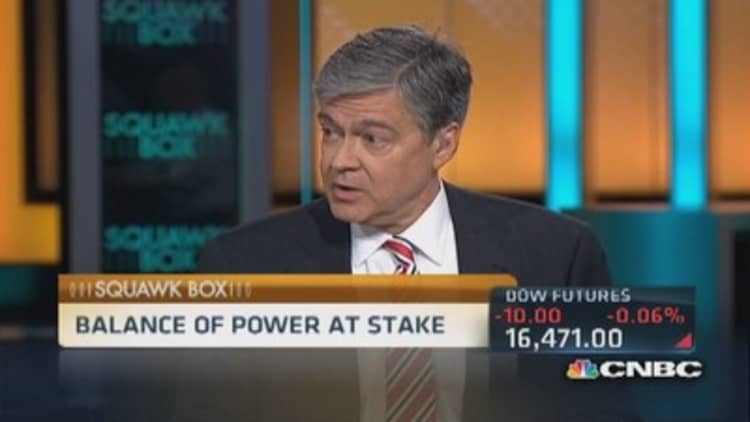
Midterm elections for an unpopular president's party are almost always bleak. But this year could be even bleaker than usual for Democrats.
Why? Because the evolving structure of the 21st century national Democratic coalition makes its challenge in turning out supporters historically difficult. The ability of Democrats to counter the problem will help determine how politically difficult President Barack Obama's last two years in the White House could become.
Turnout for American presidential elections (roughly 6 in 10 eligible voters in recent contests) is always higher than for midterm congressional elections (fewer than half). But the rate of falloff from one to the next varies for different groups of voters.
In 2012, exit polls showed, Obama won a second term by rolling up margins of 11 percentage points among women; 24 percentage points among voters ages 18 to 24,;and 87 percentage points among blacks. Over the last four midterm elections, turnout by all three groups fell more from the previous presidential race than turnout by Republican-leaning men, whites and those over 65.
On Tuesday, six states are holding primary elections, contests that could have major consequences for the general election.
Young voters have abandoned the midterm electorate at more than twice the rate of seniors. Latinos, who favored Obama by a margin of 44 percentage points, have voted at just two-thirds the rate of whites. Unmarried women, the source of the Democratic advantage with women, vote less often than their married counterparts.
Read More $,$$$,$$$,$$$: Is the billion dollar political donor around the corner?
Democrats have begun efforts to mitigate the damage, with their House and Senate campaign committees tripling investments in voter mobilization since the last election. With its sophisticated voter identification and mobilization programs, the 2012 Obama presidential campaign produced a more Democratic-leaning electorate than many Republicans had thought possible. In 2014 battlegrounds such North Carolina and Colorado, vulnerable Senate Democratic incumbents hope to capitalize on the results of those efforts the way Terry McAuliffe did in winning the Virginia governorship last year.
But most of the crucial Senate races lie in battleground states so friendly to former presidential candidate Mitt Romney that Obama did not contest them in 2012. Of the 12 top battlegrounds, only four were carried by the president. Eight went to Romney, including deep-red territory such as Arkansas, Alaska, Louisiana and Montana.
Democrats have some offsetting assets. One is continued growth among the non-white population; exit polls from the 2010 midterm election showed that the white share of the electorate declined to 77 percent from 79 percent in 2006, even amid a House Republican landslide.
Obama's party can try to motivate Latinos by blaming Republicans for blocking immigration legislation, and women by blaming Republicans for blocking equal-pay and early childhood education legislation. Although Republicans attack the new health-care law to motivate their base, Democrats can warn young voters that repealing it would kick young adults under 26 off their parents' insurance plans.
Read More
More broadly, Democrats can try to alarm supporters by exploiting the Republican Party's long-running image of being out of touch on economic problems and intolerant on issues such as same-sex marriage. For his part, Obama can raise money to help voter mobilization, use his megaphone to push popular priorities such as a higher minimum wage, and rally key constituencies in the home stretch.
But President Ronald Reagan did similar things during the 1986 midterms, when his approval rating was 20 percentage points higher than Obama's now. Republicans lost the Senate anyway.
Read More Jarrett sees immigration, wage bills getting done
None of this points toward numerically large losses for House Democrats. With so few districts up for grabs, experts say even a strong election day performance would add fewer than 20 seats to the House Republican majority.
Senate races pose the greater risk for Democrats. A net gain of six seats by Republicans would give them control, deepening the party's ability to thwart Obama in his final chapter.
—By CNBC's John Harwood. Follow him on Twitter: @JohnJHarwood


